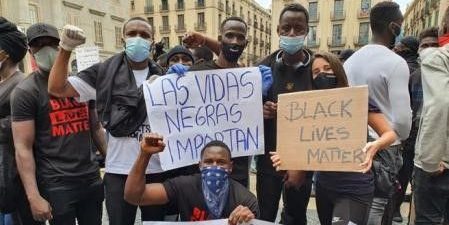The “Study on initiatives and demands for reparation of colonialism and slavery in Spain” identifies 46 colonial and racial reparation actions in the territory of the State.
The European Observatory on Memories (EUROM) of the UB Solidarity Foundation has published the second Study on initiatives and demands for reparations for colonialism and slavery in Spain. Available in English and Spanish, the document brings together 46 initiatives and demands for reparations for individuals, families or groups who suffer or have suffered historical injustices of a racial nature in Spanish territory.
The report was launched on 21 March 2024, coinciding with the start of the International Week of Solidarity with Peoples Struggling against Racism and Racial Discrimination, and around the International Day of Remembrance of the Victims of Slavery and the Transatlantic Slave Trade on 25 March. The dissemination campaign highlights, with a series of images, some of the most emblematic cases of the study.
The study stems from the Trans-Atlantic Racial Redress Network, led by Columbia University (New York) and the Thurgood Marshall Center for Civil Rights at Howard University, with the aim of identifying and promoting colonial and racial redress actions in the US context.
The project began to be replicated and adapted to the European context in a collaboration initiated in 2021 between the NIOD Institute for War, Holocaust and Genocide Studies in the Netherlands and EUROM, with mappings for the Dutch and Spanish cases. The collaboration resulted in a first report, which in 2022 was presented at the ‘Historical Dialogues’ conference in Amsterdam and the ‘Repairing the Past’ conference in Barcelona. This initial report provided a working basis and a preliminary methodology, which EUROM has now developed, in a more complete and detailed way, in this second report.
According to the historian and coordinator of the study Celeste Muñoz Martínez, the document presented is not intended to become an exhaustive database, but rather it is expected that its open publication will allow dialogue with other projects and include more demands or actions. “From legislative initiatives to protest movements, through the decolonization of public space or museums, the report reflects on the genealogies of these movements in the State and offers a sample to open spaces for debate and discussion,” highlights Muñoz.
Particular features of the study
While reparations claims in the North American context date back to the American Civil War and mainly address grievances related to slavery and the African-American population, in Spain, movements critical of the colonial past and its legacies are mainly led by diaspora communities, linked to the trajectories of anti-racist movements.
Through the narrative of a common experience, these communities identify themselves as holders of reparation rights and understand that past colonial violence persists in the present through mechanisms of racial discrimination and impoverishment of the global south. While not all of their initiatives and demands can be directly considered as forms of reparations, the EUROM research interprets them as part of the same phenomenon that contributes to creating new, more democratic and inclusive memories, encourages compensation and recognition initiatives, and advocates for specific reparations’ legislation.

